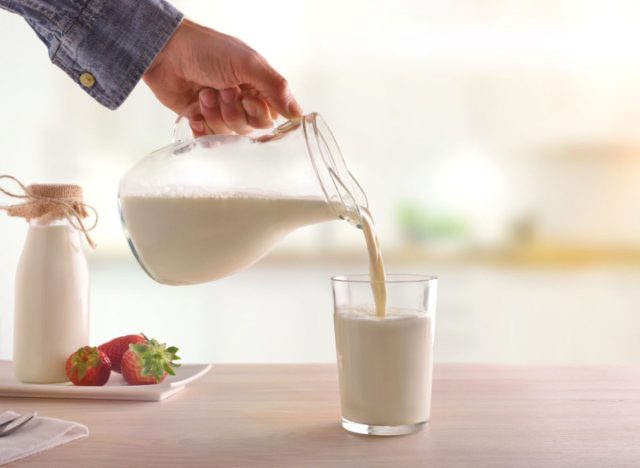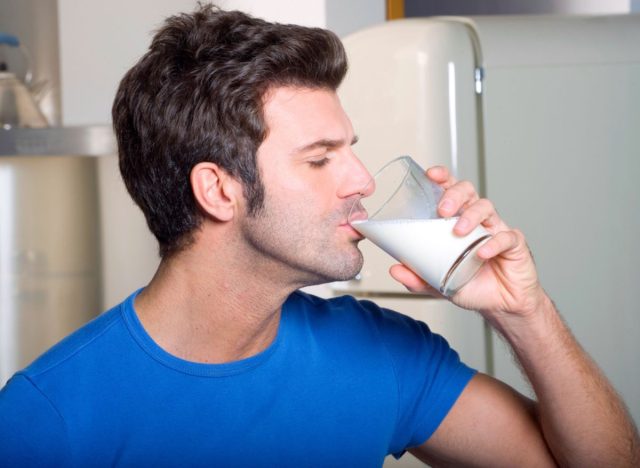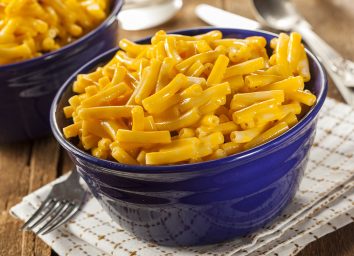The #1 Worst Drink for Prostate Cancer, New Study Suggests

It's hard to believe, but the American Cancer Society (ACS) estimates roughly one in eight American men will be diagnosed with prostate cancer. Besides skin cancer, prostate cancer is the most diagnosed cancer among U.S. males and the second leading cause of cancer-related death among American men.
For just 2022 alone, the ACS predicts around 268,490 new prostate cancer diagnoses and 34,500 new deaths related to prostate cancer.
Frustratingly, modern medicine still can't say for sure exactly what causes prostate cancer. Just like any other form of the disease, prostate cancer develops on the cellular level due to DNA changes and mutations. Some of these gene mutations are inherited, but many aren't. In fact, the ACS tells us that most prostate cancer-related gene mutations seen in men are not inherited but acquired at some point during patients' lives.
So, what are some identified external risk factors that may make a man more likely to develop prostate cancer? To start, age. Just about 60% of all prostate cancer diagnoses are among men older than 65.
Another possible risk factor is obesity. Some research has found that abdominal obesity is associated with a more aggressive form of prostate cancer. An unexpected factor could also be being a widower. One study even reported that widowed men are more likely to develop an advanced form of prostate cancer.
Now, new research conducted at Loma Linda University and published in the American Journal of Clinical Nutrition has identified a potential new major dietary risk factor tied to prostate cancer. Read on to learn more!
More milk may spell prostate trouble

There's a lot to like about milk. It's absolutely chock-full of essential vitamins and minerals, great for bone health, and packs a powerful protein punch to boot. This new study's findings, however, indicate that drinking milk is associated with a greater risk of prostate cancer.
Study authors report men with a high usual intake of dairy milk face a significantly elevated risk of prostate cancer in comparison to other men drinking less milk. More specifically, the research found that men drinking about 430 grams of dairy daily (1.75 cups of milk) showed a full 25% greater risk of prostate cancer than other men drinking less milk on a daily basis (about a half a cup weekly). Prostate cancer risk among daily milk drinkers was even higher when compared to men avoiding dairy altogether.
Calcium has been linked to prostate cancer in the past, and dairy products like milk contain tons of calcium. Importantly, though, the research team says they observed absolutely no correlations between increased prostate cancer risk and ingestion of non-dairy calcium. In other words, while it's clear that something in milk is linked to prostate cancer development – it isn't just calcium.
"Our findings add important weight to other evidence associating dairy products, rather than non-dairy calcium, as a modifiable risk factor for prostate cancer," says Gary Fraser, MBChB, PhD, the study's principal investigator and professor at Loma Linda University School of Medicine and School of Public Health, in a press release.
Interestingly, no associations were seen between prostate cancer risk and intake of both cheese and yogurt.
Prostate cancer risk plateaus around 150 grams of milk daily
Study authors stress that their work did not find that prostate cancer risk increases indefinitely as more milk is ingested. Risk increases appear to level off around two-thirds of a cup of milk daily.
"Most of the continuing increase in risk is done with by the time you get to 150 grams, about two-thirds of a cup of milk per day," Dr. Fraser explains. "It's almost as if some biological or biochemical pathway is saturated at about two-thirds of a cup of milk per day."
Solving the milk mystery

As touched on earlier, this study makes a strong case that calcium alone is not responsible for the association between prostate cancer and milk. So, what's going on here?
"One interpretation is that dairy foods, or some closely associated unknown risk factor, are causally related to the risk of prostate cancer," the study reads.
Dr. Fraser theorizes that the sex hormones found in dairy milk may be involved. Most (up to 75%) lactating dairy cows are pregnant, and prostate cancer just happens to be a hormone-responsive cancer. Moreover, prior research has found that ingesting dairy and other animal proteins is linked to higher levels of a specific hormone in the blood (IGF-1), and IGF-1 is believed to support the growth of certain cancers, including prostate cancer.
Milk is also linked to breast cancer
This work pairs well with an earlier study conducted at LLU. That project found that dairy milk ingestion is associated with greater breast cancer risk in women.
"The parallels between our breast cancer in women paper a year ago and this paper relating to men, are striking," Dr. Fraser comments. "It seems possible that the same biological mechanisms are at work."
The takeaway
In conclusion, the study authors caution that their findings do not confirm that dairy milk causes prostate cancer, only that there is an association between milk intake and increased prostate cancer risk. More research is ultimately needed before any final conclusions can be agreed upon.
That being said, researchers still say it's probably a prudent idea for men with a family history of prostate cancer to think twice about consuming even moderate amounts of dairy milk.
"If you think you're at higher-than-average risk, consider the alternatives of soy, oat, cashew, and other non-dairy milks," Dr. Fraser concludes.
The research
These findings aren't based on a small-scale research project. Over 28,000 men living in North America took part in this study, which entailed an average tracking period of just under eight years.
All participants were cancer-free at the beginning of the study, but individual dairy/calcium ingestion habits varied greatly. Some men were drinking tons of milk, others avoided dairy completely. Each man's usual dairy intake was estimated via food frequency questionnaires (FFQ) and 24-hour dietary recalls. Also, a baseline survey completed by each subject collected demographic data such as BMI, exercise habits, smoking habits, family cancer history, and any prior prostate cancer screenings.
Once all of the initial data was gathered, researchers kept an eye on cancer state registries for the next eight years. By the end of the observation period, a total of 1,254 prostate cancer diagnoses were noted among study participants.
The research team took great care to separate non-dairy calcium intake (via nuts, fruits, seeds, legumes, vegetables, etc) from dairy-related sources of dietary calcium. Then, a statistical model was used to analyze the impact of dairy ingestion regardless of any other factors (non-dairy calcium, family medical history, age, etc.)
All in all, study authors say the approach they took, and the large population sample they had to work with, put them in a unique position to research this topic.
"Because our study cohort showed a great disparity and divergence of dairy intake and calcium levels, we could ask the question with unusual strength," Dr. Fraser adds.







